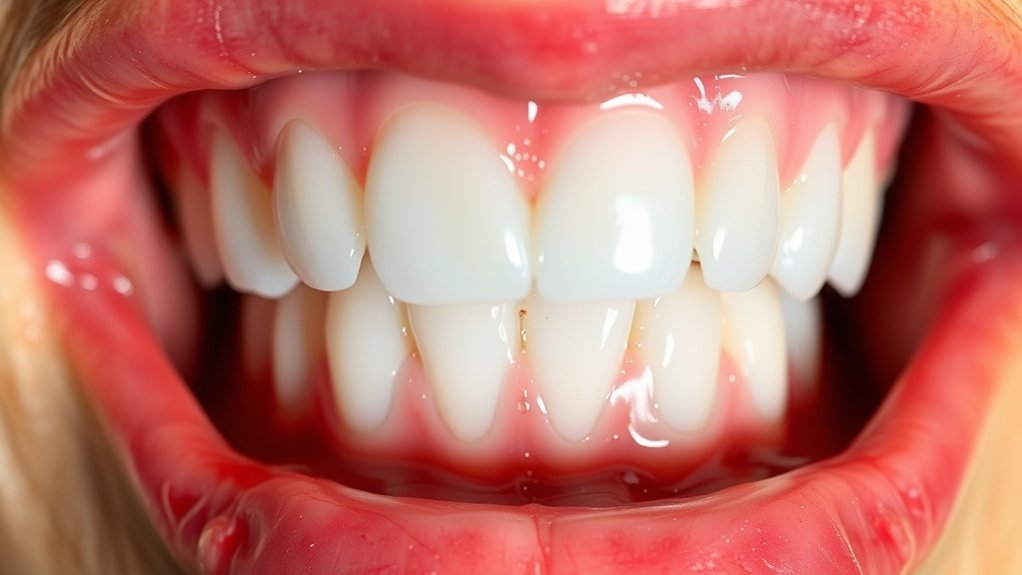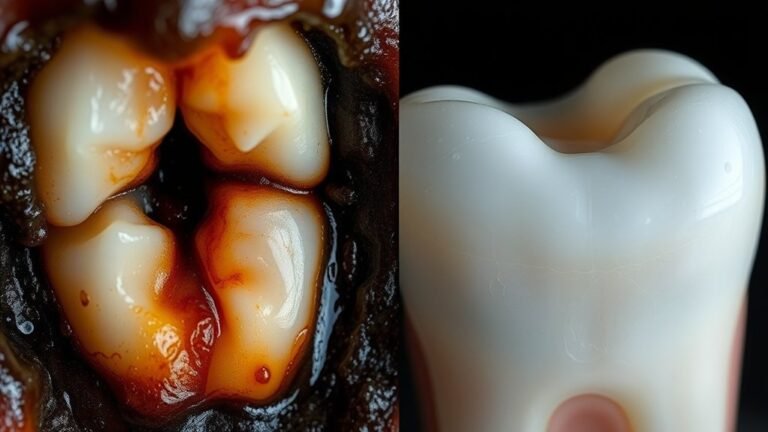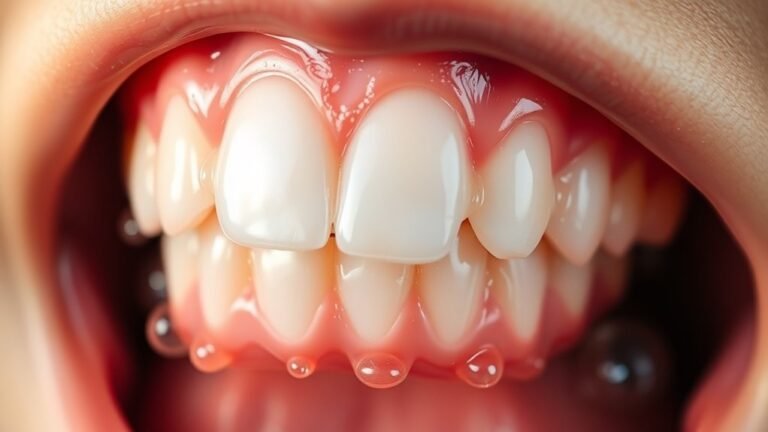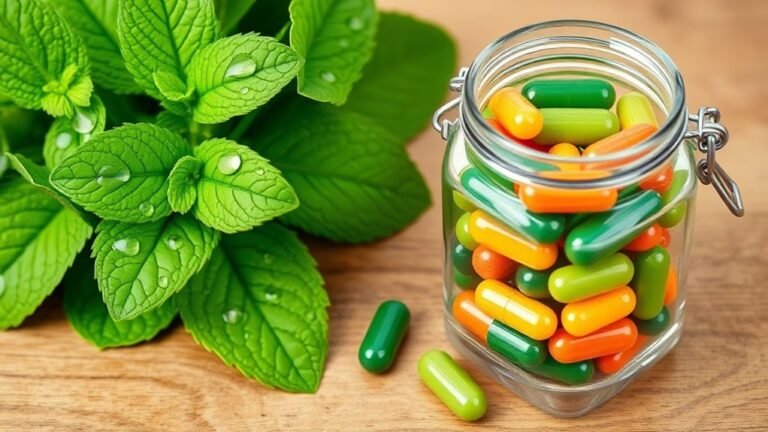What Role Does Saliva Play in Controlling Bacterial Plaque in the Mouth
Saliva plays an essential role in controlling bacterial plaque in your mouth. Its composition includes antimicrobial proteins and enzymes that actively inhibit bacterial growth, which helps maintain a balanced oral environment. Saliva also neutralizes acids produced by bacteria, protecting your enamel and facilitating remineralization. By washing away food particles, it further reduces plaque formation. Understanding these functions fully reveals just how important saliva is for oral health and the prevention of dental issues.
Key Takeaways
- Saliva contains enzymes like lysozyme and lactoferrin that target and degrade bacterial cell walls, reducing plaque formation.
- It neutralizes acids produced by bacteria, protecting enamel and maintaining a healthy oral environment.
- Saliva acts as a buffer, mitigating the harmful effects of oral bacteria and stabilizing pH levels.
- Increased saliva production during eating helps wash away food particles, minimizing plaque accumulation.
- Essential minerals in saliva, such as calcium and phosphate, support enamel remineralization and gum health, further controlling plaque.
The Composition of Saliva and Its Functions
Saliva plays an essential role in maintaining oral health, primarily due to its complex composition and various functions. Comprised of water, electrolytes, enzymes, and antimicrobial proteins, saliva directly influences the oral microbiome. It helps control plaque by flushing away food particles and bacteria, thereby reducing the risk of dental caries and gum disease. Saliva’s enzymes, such as lysozyme and lactoferrin, target harmful bacteria, enhancing your immune system‘s ability to combat infections. Additionally, saliva regulates pH levels, promoting a balanced environment conducive to beneficial bacteria. By facilitating plaque control and supporting the oral microbiome, saliva greatly contributes to your overall oral health, highlighting its indispensable role in maintaining a healthy mouth and preventing disease.
Saliva’s Role in Neutralizing Acids
Maintaining a balanced pH in the oral cavity is essential for preventing dental issues, and saliva plays a key role in this process by neutralizing acids produced by bacteria during carbohydrate fermentation. Saliva production increases when you eat, helping to wash away food particles and reduce acidity. This neutralization protects your enamel, supports calcium remineralization, and enhances oral hygiene. Additionally, saliva’s buffering capacity is vital for cavity prevention, as it mitigates the harmful effects of oral bacteria. Furthermore, saliva contributes to immune response by providing antimicrobial components.
| Function | Importance | Effect on Oral Health |
|---|---|---|
| Neutralizes Acids | Prevents enamel erosion | Reduces cavity risk |
| Supports Calcium | Aids remineralization | Strengthens tooth structure |
| Enhances Hygiene | Flushes food particles | Decreases bacterial growth |
Enzymatic Actions Against Bacterial Growth
Although many may overlook its significance, saliva contains various enzymes that actively combat bacterial growth in the oral cavity. These enzymatic actions play a vital role in controlling bacterial plaque, which can lead to dental plaque formation and gum health issues. Saliva’s enzymes, such as lysozyme and lactoferrin, break down bacterial cell walls and inhibit their proliferation, thereby reducing the risk of oral infections. By enhancing your oral health products with ingredients that mimic or support these natural enzymes, you can further bolster your mouth’s defenses. Understanding the essential role saliva plays not only informs your daily dental care routine but also highlights the importance of maintaining an ideal environment for gum health and plaque control.
The Importance of Saliva in Remineralization
A healthy mouth relies heavily on the role of saliva in remineralization. Saliva contains essential minerals like calcium and phosphate that are vital for enamel protection against tooth decay. When you engage in proper oral care routines, saliva helps neutralize acids produced by bacteria in plaque, facilitating plaque removal and enhancing the remineralization process. This natural defense mechanism not only strengthens your teeth but also plays a significant role in gum disease prevention. By maintaining adequate saliva levels, you promote a balanced oral environment that reduces the risk of cavities and supports overall dental health. Consequently, saliva is indispensable not just for remineralization but for sustaining your oral well-being.
Factors Affecting Saliva Production and Oral Health
Saliva production can be considerably influenced by various physiological and environmental factors, impacting your oral health. Adequate hydration is vital; dehydration can lead to reduced saliva production, increasing the risk of plaque buildup and gum inflammation. In addition, certain medications and medical conditions can also hinder saliva flow, exacerbating issues like gum bleeding and tooth decay. Stress levels play a role too, as they can affect your body’s ability to produce saliva effectively. Maintaining ideal saliva production is essential not only for washing away food particles but also for neutralizing acids and fighting bacteria. By understanding these factors, you can take proactive steps to enhance your oral health and minimize potential complications related to saliva deficiency.
Frequently Asked Questions
How Does Saliva Influence Taste Perception in the Mouth?
Saliva enhances taste perception by dissolving food molecules, allowing taste receptors to detect flavors. It also provides a medium for interaction between taste compounds and receptors, which is essential for accurately interpreting different tastes in your mouth.
Can Saliva Help in Healing Oral Wounds?
Yes, saliva aids in healing oral wounds by providing moisture, delivering growth factors, and containing antimicrobial properties. These elements promote tissue regeneration and reduce infection risk, enhancing overall oral health and recovery from injuries.
What Is the Relationship Between Saliva and Dry Mouth?
About 25% of adults experience dry mouth, which markedly reduces saliva production. This relationship impairs natural oral defenses, increases plaque buildup, and heightens the risk of cavities and gum disease, affecting overall oral health.
Does Saliva Contain Any Antimicrobial Properties?
Yes, saliva contains antimicrobial properties. It includes enzymes like lysozyme and lactoferrin, which inhibit bacterial growth, helping to maintain oral health and reduce the risk of infections and dental issues associated with bacterial plaque buildup.
How Does Hydration Affect Saliva Production?
Hydration greatly impacts saliva production; studies show that dehydration can reduce saliva flow by up to 50%. Staying hydrated guarantees your mouth remains moist, aiding digestion and maintaining oral health by controlling bacterial growth effectively.
Conclusion
In the intricate dance of oral health, saliva acts as your mouth’s unsung hero, tirelessly battling harmful bacteria and neutralizing acids. Picture a protective shield, rich in enzymes, working to remineralize your teeth like a skilled artisan restoring a masterpiece. Yet, factors like stress and dehydration can diminish this essential flow, leaving your mouth vulnerable. By understanding saliva’s important roles, you can better safeguard your oral health and guarantee that this natural defense remains strong and effective.






